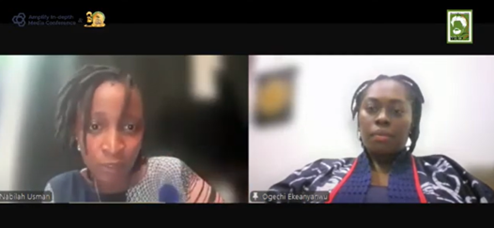The intersection of Artificial Intelligence (AI) and journalism has become a topic of great discussion in recent times. As technology rapidly evolves, its potential to influence the media industry is undeniable. However, as AI develops, it brings an array of ethical considerations, particularly in journalism. On the second day of the Amplify In-depth Media (AIM) Conference, Ogechi Ekeanyanwu, Regional Coordinator for Sub-Saharan Africa at SciDev.net, shared her valuable insights on AI’s responsible and ethical use in journalism. In her insightful remarks, she emphasised the importance of a foundational understanding of journalism, intergenerational collaboration, and evidence-based reporting.
Ekeanyanwu began by highlighting the essential foundations for any budding journalist. According to her, the first step in preparing new journalists for the complexities of the profession is ensuring they have a clear grasp of journalistic ethics. She noted, “If a young person is going into journalism, they first need to understand the basic journalistic standards. These include accuracy, fairness, independence, objectivity, accountability, transparency, and truth.” These principles, she emphasised, are not just abstract concepts – they are the bedrock of journalism that ensures the integrity and reliability of the stories we share with the world. Without these foundational pillars, the work of journalists can quickly become compromised, leading to misinformation and loss of public trust. Once journalists have these values in place, Ekeanyanwu suggested, they will be better prepared to understand the significance of evidence-based reporting and fact-checking.
One of the central points of Ekeanyanwu’s discussion was the role of AI in journalism. She clarified that AI can play a significant role in enhancing journalistic work. Still, it should never replace the crucial human elements of data gathering, fact-checking, and ethical decision-making. As she puts it, “It’s the way that you use AI that I think is the conversation we’re having right now – the way that we can use it to enhance our work as opposed to outsourcing the entire work to AI.”
Ekeanyanwu’s thoughts on mentorship and cross-generational collaboration in journalism also resonated deeply. She spoke about the value of pairing seasoned, experienced journalists with younger generations more adept with technology. “You have the old-school journalists or established, experienced journalists who understand the basic and the fundamental ethics of journalism, and then they’re teaching the new journalists.” Mentorship is critical in ensuring that younger journalists are grounded in the profession’s ethics. With AI tools becoming increasingly prevalent, there is a risk that younger journalists may neglect the importance of fact-checking and verification processes while proficient in using technology. The experienced journalists, Ekeanyanwu noted, bring a depth of knowledge that is invaluable in teaching new journalists how to slow down, take their time, and ensure the accuracy of their work. Ekeanyanwu also pointed out that mentorship is a two-way street. While older journalists pass down their expertise, younger journalists bring digital literacy and adaptability. “What the younger generation can offer is adaptability,” she said, “These ones were born into this technology, and so they’re quick to learn to use the different available tools.” The synergy between the two generations can foster a more ethical, efficient, and well-rounded approach to journalism.
In addition to addressing the practices within newsrooms, Ekeanyanwu also highlighted the importance of teaching ethical AI usage at the educational level. She advocated for a more comprehensive integration of ethics into the curriculum for journalism students and those in related fields. “We need to start teaching them ethical usage of AI and how AI can be used to supplement learning and supplement the work that they would eventually do,” she suggested. By instilling these values early on, Ekeanyanwu believes that the next generation of journalists will be better equipped to navigate the complex relationship between AI and ethics. Moreover, she urged media organisations to self-regulate and actively engage with the ethical implications of AI use, ensuring that the benefits of technology are balanced with a commitment to responsible journalism. Watch the full panel session on day two of the AIM Conference here.


